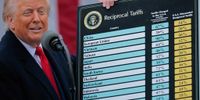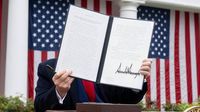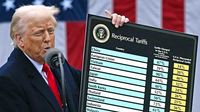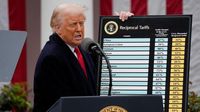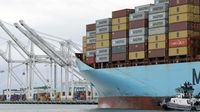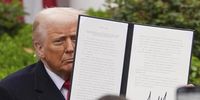On April 2, 2025, President Donald Trump announced a hefty 31% tariff on imports from Switzerland, a move that has sent shockwaves through the Swiss economy and raised eyebrows internationally. This tariff is notably higher than the 20% imposed on European Union imports, highlighting a targeted approach by the Trump administration aimed at addressing perceived trade imbalances.
In a striking revelation, Trump indicated that the tariffs are a response to the significant trade deficit the United States has with Switzerland, which stood at approximately 38.5 billion francs in 2024. The tariffs are designed to encourage Swiss companies to either reduce exports to the U.S. or establish production facilities on American soil. This strategy, however, has been met with skepticism, as many question the legitimacy of the figures cited by the Trump administration.
Swiss President Karin Keller-Sutter expressed her concerns, stating, "The long-term economic interests of the country are a priority," while emphasizing the importance of international law and free trade. The Swiss government has so far decided against retaliatory measures, opting instead to analyze the implications of the tariffs and engage in discussions with U.S. authorities.
According to Ngozi Okonjo-Iweala, Director-General of the World Trade Organization (WTO), these tariffs could contract global trade volumes by about 1% this year. This assessment combines the new tariffs with those previously announced since Trump’s return to power in January 2025. The WTO had originally anticipated a 3% growth in global trade volume.
The impact of the tariffs is expected to be far-reaching, particularly for Swiss exports of chocolate, cheese, and watches, which are emblematic of the country's strong export economy. For instance, a 100-gram bar of Cailler Cremant chocolate, priced at $7.29 on Amazon, will see its cost rise to $9.55 after the tariff is applied. Similarly, Gruyere cheese, which typically sells for between $55 and $74 per kilo in New York, could see a 200-gram portion priced between $15 and $20 due to the new tariffs.
Furthermore, luxury watches, such as the MoonSwatch, which retails for around $270, may exceed $350 once the tariffs take effect. These price increases raise concerns about a potential decline in sales, especially as consumers may turn to cheaper alternatives.
Despite the grim outlook, Swiss Economy Minister Guy Parmelin remains optimistic, asserting that Switzerland is not expected to enter a recession. He noted that the Swiss economy has demonstrated resilience in the past, with effective stabilizers in place. The Federal Council is scheduled to visit the U.S. from April 20 to April 23 to further discuss the situation.
As the situation unfolds, the Federal Council has stated that it does not currently plan to implement any direct countermeasures. Instead, they aim to maintain open communication with U.S. officials and explore potential agreements to mitigate the impact of the tariffs. Parmelin remarked that the American decisions are "difficult to understand" and could negatively affect supply chains, ultimately impacting American consumers as well.
In a broader context, the tariffs have triggered reactions from various global leaders. Polish Prime Minister Donald Tusk described the tariffs as a "painful and bitter blow" for Poland, predicting a 0.4% reduction in the Polish GDP due to the new trade barriers. French Foreign Minister Jean-Noel Barrot called for unity among European nations in response to Trump's aggressive trade policies.
The financial markets reacted swiftly to Trump’s announcement, with the Dow Jones falling by 2.81%, the Nasdaq dropping by 4.60%, and the S&P 500 decreasing by 3.39%. White House spokeswoman Karoline Leavitt defended the tariffs, stating, "The United States will no longer suffer the cheating of foreign countries," urging Wall Street to trust Trump’s economic strategy.
Industry experts warn that the tariffs could have devastating effects on small and medium-sized enterprises (SMEs) in Switzerland, which may struggle to absorb the increased costs. The Swiss pharmaceutical sector, while partially protected by bilateral agreements, is also at risk, as is the luxury watch industry, which may lose significant market share in its primary market.
As the Federal Council prepares to navigate this challenging landscape, discussions are underway regarding the potential for new trade agreements and partnerships. The government is under pressure to respond effectively to the tariffs, with calls from the business community for swift negotiations to protect Swiss interests.
In conclusion, the imposition of a 31% tariff on Swiss imports by the U.S. marks a significant escalation in international trade tensions. As both nations grapple with the implications of these tariffs, the future of Swiss exports, particularly in key sectors such as pharmaceuticals, watches, and food products, hangs in the balance. The coming weeks will be crucial in determining how Switzerland adapts to this new trade reality and whether diplomatic efforts can lead to a more favorable outcome.
